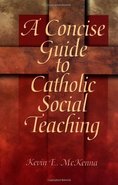Social Justice
Catholic social teaching is often called the Catholic Church's "best kept secret." Living as a disciple means treating our neighbors as ourselves, both in individual interactions, as well as through how our society operates. The Church's social teaching gives us solid principles to live and organize by.
Key Insights
|
Dignity of the Human Person
Every human being is created in the image of God and worthy of respect. Human dignity comes from being human, not from what the person does or who the person is. This is the core foundation of Catholic social teaching. |
The Common Good
We must insist on social conditions that allow people to reach their full human potential and maintain their human dignity. These conditions require respect, peace, security, and harmony within societies and across international borders. |
Respect for Human Life
Since every human has dignity, human life is seen as sacred and to be protected from conception to natural death. |
|
Association
Humans are inherently social. The way we organize society has a direct affect on human dignity and the common good. Family is the most basic form of association and must particularly be promoted and protected. |
Solidarity
The principle of solidarity holds that we are all children of God and members of the same family. Despite all differences and distances, we are called to love our neighbors and fight for what is best for them. |
Participation
All people have a right to participate in society, in order to work together for the common good. Democratic participation in decision making respects the dignity of all. |
|
Subsidiarity
Problems and functions should be handled by the lowest-level organization -- the one closest to it -- that can efficiently and effectively handle it. This is a proper limit to place on governments, and abusive governments often violate this rule. |
Preferential Protection
for the Poor and Vulnerable The needs of the poor and powerless have to come first. This is necessary to hold society together, promote the common good, and make sure everyone's needs are met. |
Stewardship
We are called to be good caretakers of everything from God's creation to our talents, property, and other resources. We must take care of the planet not only for the planet's sake, but also because neglect of creation usually has the largest impact on those who are the most vulnerable in the world. |
|
Dignity of Work
Work and the economy serve people, not the other way around. Everyone has a right to work. Everyone also has a right to work with dignity: productive work, decent and fair wages, the organization and joining of unions, private property, and economic initiative. |
Quotations
Church statements, structures and initiatives are important for Catholic formation and action. Social ministry programs and structures provide valuable opportunities for believers to learn to act on the justice demands of their faith. Church social ministry efforts should encourage and complement the vital roles of believers in family, economic and public life. However, there is simply no substitute for Catholic men and women carrying their faith into the world. Everyday discipleship for justice and the Church's organized social ministry can reinforce one another and help shape a more just society and more peaceful world. We hope these reflections can serve as an opportunity for increased dialogue on the demands of discipleship in our time. |
The Word of God calls believers to become "the salt of the earth, the light of the world." The Pope and the bishops are called to teach and lead, but unless the Church's social teaching finds a home in the hearts and lives of Catholic women and men, our community and culture will fall short of what the Gospel requires. Our society urgently needs the everyday witness of Christians who take the social demands of our faith seriously. The pursuit of justice is an essential part of the Catholic call to holiness, which is our true vocation: to live "in Christ," and let Christ live and work in us in our world today. Catholic social teaching is a central and essential element of our faith. Its roots are in the Hebrew prophets who announced God's special love for the poor and called God's people to a covenant of love and justice. It is a teaching founded on the life and words of Jesus Christ, who came "to bring glad tidings to the poor . . . liberty to captives . . . recovery of sight to the blind"(Lk 4:18-19), and who identified himself with "the least of these," the hungry and the stranger (cf. Mt 25:45). Catholic social teaching is built on a commitment to the poor. This commitment arises from our experiences of Christ in the eucharist. |
Church Documents
Papal/Synod Documents
U.S. Bishops' Documents
Books

Catholic Social Teaching: Learning & Living Justice
by Michael Pennoc Introduces the Church's rich body of social teaching that comes to us from the essential writings of the popes, highlighting the works from Pope Leo XIII onward. While exploring how societies work, an overarching theme of the text is a discussion of the foundational values that ought to govern a just society. (Amazon) |

A Concise Guide to Catholic Social Teaching
Kevin E. McKenna Offers an overview of the history of the Church's social teaching for students, teachers and lay people as well as clergy. The author presents outlines of both recent and historic key documents. (Amazon) |

Catholic Social Teaching: Our Best Kept Secret
Edward P. Deberri, et al. Offers an overview of the history of the Church's social teaching for students, teachers and lay people as well as clergy. The author presents outlines of both recent and historic key documents. (Amazon) |
Articles
- Ten Building Blocks of Catholic Social Teaching (America Magazine)
- Notable Quotations From Catholic Social Teaching (Catholic Charities of St. Paul and Minneapolis)
Organizations & Websites
- Education For Justice - "...created to help teachers, social action directors, parish members, campus ministers, and others in leadership roles to meet the challenge of sharing Catholic Social Teaching and bring greater awareness to social justice issues. Through all of the materials available on the web site, we seek not only to introduce Catholic Social Teaching to a wider audience but to help deepen the knowledge of this essential element of faith and to help develop solidarity with all those in the global community who are suffering and oppressed." Includes homily suggestions for every week in the lectionary.
- JustFaith - "JustFaith Ministries provides programs that transform people and expand their commitment to social ministry. Through these life-changing opportunities, members of a church or parish can study, explore and experience Christ’s call to care for the poor and vulnerable in a lively, challenging, multifaceted process in the context of a small faith community."
- Catholic Social Teaching - U.S. Bishops.
- Catholic Social Teaching - Overview on Wikipedia.
